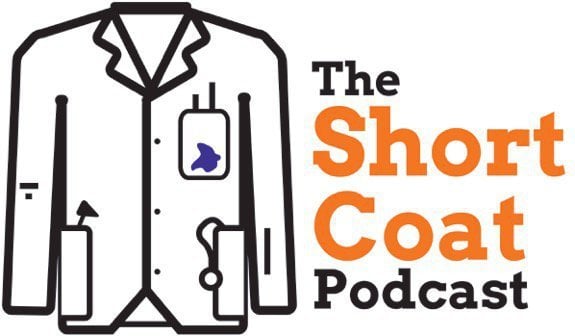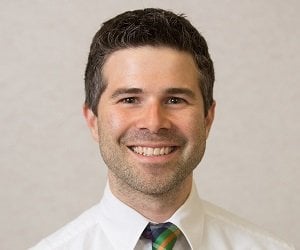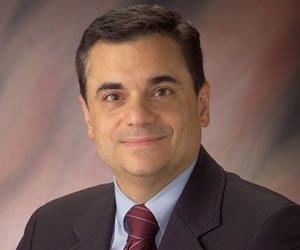advice
Surviving Your First Year as a Doctor
It’s your biggest dream and quite possibly your biggest fear at the same time. Your … Read more
Q&A with Dr. Shane Quinonez, Pediatric Geneticist
Dr. Shane Quinonez is a Clinical Assistant Professor and the Associate Program Director of the Pediatric Residency Program at The University of Michigan. He earned his MD at The University of Michigan and then completed his pediatrics, medical genetics, and biochemical genetics training there as well.
When did you first decide to become a physician? Why?
I wish I could answer this question by showing a childhood picture of myself with a toy stethoscope around my neck. The truth is not nearly as cute. As an undergraduate student at The University of Toledo, I initially enrolled in pharmacy school, thinking I would become a pharmacist. Around my sophomore year I began reflecting on what truly gave me fulfillment in all of my previous jobs, educational experiences, and extracurricular activities. I quickly realized that I was most happy when I was interacting directly with people and was presented with opportunities to improve their lives. While these elements were clearly available in pharmacy, I felt that I would be best able to explore these interests as a physician. Though my decision was fairly calculated, I do not think I would be nearly as fulfilled and happy with my choice had I not made that decision based on the person I truly am rather than the person I wanted to be.
Jump Starting Your Job Search While In Medical School: Part 1
When you are in medical school, your job search may feel like a project that’s light years away. While it’s true that your number one priority is succeeding in medical school, it’s a good investment of your time to get educated about what your job search will look like. If you’re knowledgeable about what the job search process is, you can take small, but meaningful steps now, like cultivating great relationships with potential references, attending conferences, and gaining clarity around what kind of work environment is a match for your preferences and goals. Consider these steps to jump start your job search while in medical school, and integrate these steps into your process as you learn and prepare for your career.
Things I Didn't Realize About Medicine Until I Became a Physician
Recently SDN member medinquirer noted that it’s common for premed students to learn about medicine through shadowing, volunteering, working in related fields, etc. But surely, said medinquirer in his post, there are things you don’t realize about medicine until after you become a full-fledged, practicing physician. What are those things? Here are some of them of them, as shared by members of the SDN community:
SurfingDoc:
No one teaches you about billing, prior authorizations, etc. until to have to do them. There is no real “education” in those endeavors, but they are part of the system and a requirement of the job.
Six Things to Remember While Parenting in Medical School
Some advice to help you be both a professional student and the best parent you can be.
20 Questions: Ross D. Zafonte, DO, Physical Medicine and Rehabilitation
Ross D. Zafonte, DO, is Earle P. and Ida S. Charlton professor and chairman of the Department of Physical Medicine and Rehabilitation at Harvard Medical School. He also serves as chief of physical medicine and rehabilitation at Massachusetts General Hospital, as well as vice president of medical affairs research and education at Spaulding Rehabilitation Network. Zafonte received his bachelor’s degree in psychology and biochemistry from University of Georgia (1981) and his DO from Nova Southeastern University College of Osteopathic Medicine (1985). He completed a one-year internship at Henry Ford Bi-County Hospital, followed by a residency in rehabilitation medicine at Mount Sinai School of Medicine, where he was also chief resident. Dr. Zafonte was a program fellow in research enrichment at the National Institute on Disability and Rehabilitation.
Dr. Zafonte has been on faculty at Thomas Jefferson University, University of Missouri, Wayne State University, and University of Pittsburgh. He has published extensively, authoring more than 250 peer review journal articles, abstracts and book chapters. His work can be found in Brain Imaging and Behavior, Critical Care Medicine, Journal of Burn Care & Research, Journal of the American Medical Association, PM&R, Archives of Physical Medicine & Rehabilitation, and Movement Disorders. Dr. Zafonte serves on the Board of Governors for the International Brain Injury Association, as well as the American Congress of Rehabilitation Medicine.
Searching for Your Dumbledore: Finding a Mentor
Where would Harry be without Dumbledore? We all need mentors, and they can be critical throughout your career development. Whether you are an undergraduate thinking about applying to graduate or professional school, a medical student wading through residency options or a post-doc looking for faculty positions, the relationships you develop with your mentors can be invaluable. Mentors can give advice, provide encouragement or a reality check, offer insight from their experience, and expand your network by connecting you with their own friends and colleagues. The ideal mentoring relationship is one that evolves over time where the mentor takes a genuine interest in the success of the mentee. We all recognize that mentors are important. But how do you find them? And, once you have, how do you nurture the relationship so it can thrive?
The One Thing They Never Tell You About Medical School
They tell you about the studying. They tell you about the long nights. They even start telling you about the lives you’re going to potentially save. In the months leading up to medical school, everyone has something to tell you. The neighbor next door, the relative you’ve never talked to before, even the guy who’s waiting next to you at Starbucks — everyone has some advice, some wisdom, some little token of knowledge to impart upon you as you begin this journey towards becoming a doctor.
Eventually those months turn into weeks and those weeks into days, and Orientation Week somehow finally manages to arrive. Freshly white-coated, you’re ready to take on the world and tackle this beast called medical school only to be swept away by the crashing wave of new advice emanating from nearly every direction — from academic advisers, from trialed and tested second year students, from school administrators, even from your fellow first years who’ve already started studying for board exams that won’t be taken for another four years. So by the end of the first week of school, you’ve accumulated 17 different versions of “the best way to study,” nine different lists of “the books you really need to get,” and five different takes on whether or not going to class is important.









